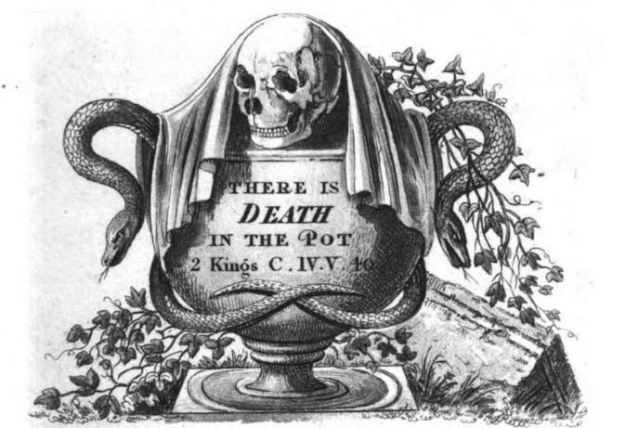
On the first Sunday in the year 1749, Mr. Thomas Lilly, the son of a farmer in the parish of Kelso in Roxburghshire, a young man intended for the Church of Scotland, remained at home to keep the house in company with a shepherd’s boy, all the rest of the family, except a maid-servant, being at church. The young student and the boy being by the fire whilst the girl was gone to the well for water, a venerable old gentleman, clad in an antique garb, presented himself, and after some little ceremony, desired the student to take up the family bible which lay on a table, and turn over to a certain chapter and verse in the Second Book of Kings. The student did so, and read—“there is death in the pot.”
On this the old man, with much apparent agitation, pointed to the great family pot boiling on the fire, declaring that the maid had cast a great quantity of arsenic into it with an intent to poison the whole family, to the end she might rob the house of the hundred guineas which she knew her master had lately taken for sheep and grain which he had sold. Just as he was so saying the maid came to the door. The old gentleman said to the student, “remember my warning and save the lives of the family!” and that instant disappeared.
The maid entered with a smiling countenance, emptied her pail, and returned to the well for a fresh supply. Meanwhile young Lilly put some oatmeal into a wooden dish, skimmed the pot of the fat and mixed it for what is called brose or croudy, and when the maid returned, he with the boy appeared busily employed in eating the mixture. “Come, Peggy,” said the student, “here is enough left for you; are not you fond of croudy?” She smiled, took up the dish, and reaching a horn spoon, withdrew to the back room. The shepherd’s dog followed her, unseen by the boy, and the poor animal, on the croudy being put down by the maid, fell a victim to his voracious appetite; for before the return of the family from church it was enormously swelled, and expired in great agony.
The student enjoined the boy to remain quite passive for the present; meanwhile he attempted to shew his ingenuity by resolving the cause of the sudden death of the dog into insanity, in order to keep the girl in countenance till a fit opportunity of discovering the plot should present itself.
Soon after his father and family with the other servants returned from church.
The table was instantly replenished with wooden bowls and trenchers, while a heap of barley bannocks graced the top. The kail or broth, infused with leeks or winter-cabbages, was poured forth in plenty; and Peggy, with a prodigal hand, filled all the dishes with the homely dainties of Teviotdale. The master began grace, and all hats and bonnets were instantly off; “O Lord,” prayed the farmer, “we have been hearing thy word, from the mouth of thy aged servant Mr. Ramsay; we have been alarmed by the awful famine in Samaria, and of death being in the pot!” Here the young scholar interrupted his father, by exclaiming— “Yes sir, there is death in the pot now here, as well as there was once in Israel! Touch not! taste not! see the dog dead by the poisoned pot!”
“What!” cried the farmer, “have you been raising the devil by your conjuration? Is this the effect of your study, sir?” “No, father,” said the student, “ I pretend to no such arts of magic or necromancy, but this day, as the boy can testify, I had a solemn warning from one whom I take to be no demon, but a good angel. To him we all owe our lives. As to Peggy, according to his intimation, she has put poison into the pot for the purpose of destroying the whole family.” Here the girl fell into a fit, from which being with some trouble recovered, she confessed the whole of her deadly design, and was suffered to quit the family and her native country. She was soon after executed at Newcastle-upon-Tyne for the murder of her illegitimate child, again making ample confession of the above diabolical design.
Signs Before Death: A Record of Strange Apparitions, Remarkable Dreams, &c, John Timbs, 1875
Mrs Daffodil’s Aide-memoire: A curious story for St Andrew’s Day. Mrs Daffodil wonders why supernatural gentlemen so often appear in “antique garb:” ancestral ghosts in clan plaids, the Gentry in gold-laced coats, His Satanic Majesty in black velvet, and, apparently, an aged angel**. Are there no fashionable tailors in the Afterlife?
To be Relentlessly Informative, the turning over the pages of the Bible as a form of divination is well-known in supernatural circles. It is also known as bibliomancy, although the Holy Book is not a requirement. M.R. James used it to great effect in ‘The Ash Tree,” where Mr Crome tries to discover the secrets of the ash tree by the “old and by many accounts superstitious practice of drawing the sorts.” But in this case, it appears that the venerable gentleman, rather than opening the Book at random, “cribbed” to deliver the life-saving message.
**Spoiler Alert: We find in a second part of the story that the “angel” is Mr Lilly’s dead grandfather, who kindly directs him to a treasure.
Mrs Daffodil invites you to join her on the curiously named “Face-book,” where you will find a feast of fashion hints, fads and fancies, and historical anecdotes
You may read about a sentimental succubus, a vengeful seamstress’s ghost, Victorian mourning gone horribly wrong, and, of course, Mrs Daffodil’s efficient tidying up after a distasteful decapitation in A Spot of Bother: Four Macabre Tales.
